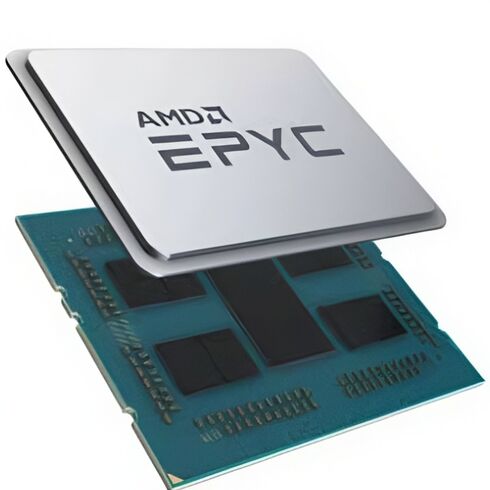P46979-001 HPE AMD EPYC 32 Core 2.8GHz CPU - 768mb L3 Cache, Socket Sp3
- — Free Ground Shipping
- — Min. 6-month Replacement Warranty
- — Genuine/Authentic Products
- — Easy Return and Exchange
- — Different Payment Methods
- — Best Price
- — We Guarantee Price Matching
- — Tax-Exempt Facilities
- — 24/7 Live Chat, Phone Support
- — Visa, MasterCard, Discover, and Amex
- — JCB, Diners Club, UnionPay
- — PayPal, ACH/Bank Transfer (11% Off)
- — Apple Pay, Amazon Pay, Google Pay
- — Buy Now, Pay Later - Affirm, Afterpay
- — GOV/EDU/Institutions PO's Accepted
- — Invoices
- — Deliver Anywhere
- — Express Delivery in the USA and Worldwide
- — Ship to -APO -FPO
- — For USA - Free Ground Shipping
- — Worldwide - from $30
Cache
The HPE AMD EPYC 32 Core 2.8GHz CPU CPU is equipped with a powerful 768MB L3 cache, which plays a crucial role in enhancing the performance and efficiency of the processor. The cache is a small and ultra-fast memory storage unit that is built directly into the CPU. It serves as a temporary storage space for frequently accessed data and instructions, enabling the processor to quickly retrieve information without having to constantly access the main memory or storage.
Benefits of a Large L3 Cache
Having a significant amount of cache, such as the 768MB L3 cache in the HPE AMD EPYC CPU, offers several advantages for users:
1. Improved Speed
The larger the cache size, the more data can be stored closer to the processor. This proximity allows the CPU to access information at a much faster rate compared to fetching data from the main memory or storage devices. The result is improved speed and responsiveness, enabling tasks to be executed swiftly.
2. Reduced Latency
Latency refers to the time it takes for data to travel from one point to another. By having a sizable cache, data that is frequently accessed can be stored nearby, minimizing the distance it needs to travel. As a result, latency is reduced, and the CPU can retrieve information more rapidly, leading to shorter processing times.
3. Enhanced Multitasking
With a larger cache, the HPE AMD EPYC CPU can efficiently handle multiple tasks simultaneously. As different applications and processes compete for resources, having ample cache space ensures that critical data remains readily available for immediate execution. This capability is particularly beneficial for users who frequently engage in resource-intensive activities like video editing, 3D rendering, or data analysis.
4. Smoother Gaming Experience
Gamers can also benefit from a substantial L3 cache. In modern games, there is a constant demand for instant access to large amounts of data, such as textures, models, and game assets. With a larger cache, the CPU can store frequently accessed game data, reducing load times and providing a smoother gaming experience with minimal lag.
The Importance of Cache for Enterprise Applications
In addition to the benefits mentioned above, a robust cache system is crucial for enterprise applications that rely on rapid data processing, such as databases, virtualization, and cloud computing. These systems handle massive amounts of data and require quick access to frequently accessed information. The large L3 cache in the HPE AMD EPYC CPU enables these applications to perform efficiently, delivering faster response times and improved overall system performance.
Socket
The HPE AMD EPYC 32 Core 2.8GHz CPU CPU features the Sp3 socket, offering a reliable and versatile platform for high-performance computing. The socket refers to the physical interface between the CPU and the motherboard, allowing for proper communication and power delivery.
Benefits of the Sp3 Socket
The Sp3 socket provides several advantages that contribute to the overall efficiency and flexibility of the HPE AMD EPYC CPU:
1. Exceptional Performance
The Sp3 socket is specifically designed for high-performance CPUs like the HPE AMD EPYC. It enables efficient power delivery and low-latency communication between the CPU cores and other components on the motherboard. This optimized design ensures that the processor can operate at its full potential, maximizing performance across various workloads.
2. Scalability
The Sp3 socket supports a wide range of processors, allowing users to easily upgrade or expand their computing capabilities without needing to replace the entire system. This scalability is particularly valuable for businesses that anticipate future growth or require the flexibility to adapt to changing computational needs. With the Sp3 socket, users can seamlessly transition to more powerful CPUs as their requirements evolve.
3. Advanced Features
The Sp3 socket offers support for numerous advanced features, such as multi-socket configurations and high-speed memory channels. Multi-socket setups allow multiple CPUs to work in tandem, resulting in increased processing power for demanding applications and workloads. Additionally, the Sp3 socket's memory channels provide high bandwidth and low latency access to system memory, enhancing overall system performance.
4. Reliability and Compatibility
The Sp3 socket is known for its robustness and compatibility across various platforms. It has undergone rigorous testing and validation processes, ensuring reliable operation and compatibility with a wide range of motherboards and server systems. This reliability is essential for businesses that require stable and consistent performance for mission-critical tasks.
The Importance of Socket Compatibility
Socket compatibility is a vital consideration when selecting a CPU since it determines whether the processor can be properly installed and function within the chosen motherboard. The Sp3 socket compatibility of the HPE AMD EPYC CPU ensures that users can seamlessly integrate the processor into their existing systems or select compatible motherboards designed to harness its full potential. This compatibility simplifies the upgrade process and guarantees optimal performance without any compatibility issues.











